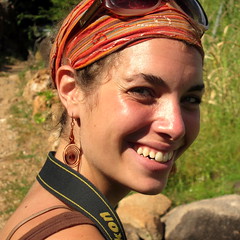I spent a few days on Likoma in April (the ferry schedule requires travelers to stick around for several nights, contributing to the island's easy rhythm), and they go down as some of my most supremely enjoyable in Malawi. Lacking the funds to charter a plane, Riley and I boarded the Ilala in Nkhata Bay, a verdant lakeside town populated by rasta wannabes and drunken British backpackers. The Ilala is part cruise ship, part minibus. Locals use it to transport goods (sacks of maize, bananas, mattresses, furniture, chickens, goats) between the mainland and the islands, so a distinctive perfume and soundtrack suffuse the lower decks. A first-class ticket, though, buys you a spot on the open top deck. It's a red-eye from Nkhata Bay to Likoma — provided the ferry is on schedule (we departed only a couple hours late). The sky felt vaster and the stars brighter as I lay on my back, swaddled in my sleeping bag to shield against the breeze. The moon rose late in the evening, an unusually yellow orb in the black sky. A Carlsberg sets you back 150 Kwacha, about a dollar, and we brought a slab of chocolate. The bar played Celine Dion's greatest hits, and a few hours in, the inevitable tune rang out. I sang along. Riley groaned. "Number one rule of maritime travel," he said. "Don't mention the Titanic."
We were scheduled to arrive at Likoma around 3 a.m. but instead dropped anchor right after sunrise. I was grateful for the daytime disembarkment. Tiny Likoma has no pier where the Ilala can dock, so lifeboats shuttle passengers from the ferry to the shore. Maximum capacity 20 people, the lifeboats claim, but why would anyone heed the order? We held out aggressive elbows and jostled our way to a worn wooden ladder, lowering ourselves onto a pitching lifeboat overloaded with passengers and cargo. I squatted on a sack of cassava and gripped a waterlogged cardboard box.
The rest of our time on Likoma proved far less stressful. We split our time between the beach and Chipyela, the main town on the island. The beach was predictably blissful — hot sand, clear and temperate water, underwear-clad children hauling in impressive catches of fish (they used nsima, maize porridge, as bait). And the town, unlike many faded, depressed Malawian villages, was lively and welcoming. Our first day we met a 17-year-old boy named Alexander, who was studying Middle Eastern geography in school. He quizzed us on capitals. "Iran?" "Tehran." "Syria?" "Damascus." "Yemen?" "Yikes, tricky one," we replied. "Sanaa," he answered, without a beat.
Alexander led us to St. Peter's Cathedral, an improbable feat of architecture. The massive granite building, with its soapstone choir stalls and stained-glass windows, feels Malawian only in its corrugated tin roof, no doubt part of a more recent renovation. We met Richard, the church reader, who agreed to lead us up one of the towers. We met only a locked hatch door — and a crowd of bats. Richard asked to swap addresses and promised to write Riley in the U.S.
Our Likoma circuit took us next to a strip of stalls selling dried goods, soap, Vaseline, eggs, salt, sugar, cooking oil. In the first days after the Ilala's arrival, you can find tomatoes and avocadoes and bananas, but these stocks dwindle as the week passes. The fish, of course, are in constant supply, usipa and matemba and other tiny varieties drying in the thousands on lakeside racks.
Well, perhaps not constant supply. Riley and I ate several meals at the brilliantly-named Hunger Clinic, a thatched roof hut meters from the water. When we asked if they had fish, Nyamwezi (whose red t-shirt read "head doctor") laughed and shook his head. "No fish?!" we cried. "No fish!" he confirmed. "But the lake!" we pointed. "No no, lake for swimming!" We instead downed massive portions of beef, beans, and rice, cheap and simple and delicious. After lunch, the television suddenly switched on — Likoma is powered by three diesel generators, which take a siesta from noon to 2 p.m.
(For the record, Nyamwezi came through for us the next day, and we shared a flaky plate of butterfish for dinner.)
One of the most astonishing things about Likoma was the lack of begging. When islanders greeted us and engaged us in conversation, their questions were not followed with appeals for money. True, children did ply us with incessant requests for balloons (some long-gone backpacker must have brought a pack and started the craze), but they were mostly eager to tag after us, recruit us for games, wave at the camera, try on our sunglasses. One young girl death-gripped my hand and pronounced firmly to her friends: "Mzungu wanga!" "My white person!" Everyone was glad to provide us with directions, which invariably instructed us to turn at that big baobab tree. Too bad the entirety of Likoma is studded with big baobab trees — only they and the mango trees remain, all the others felled for firewood.
We arrived on Likoma at sunrise and departed at the same time, this time on a sailing dhow bound for a neighboring island. We found our way to the boat in pitch darkness and only made it on time thanks to several women who interrupted their early morning tasks to correct our false turns and lead us down the proper path. We stepped over fishermen sleeping on the sand, resting for another day in their dugout canoes. The dhow's dozen passengers boarded sleepily and we set off for Chizumulu. The sails caught the morning wind and the waves caught the pink morning light and the dhow pitched across the lake. Behind us, the sun rose over Likoma Island.




No comments:
Post a Comment